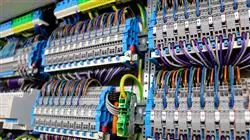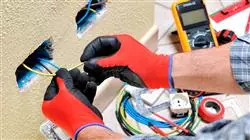University certificate
The world's largest faculty of engineering”
Introduction to the Program
Engineering professionals must continue their training during their career to adapt to new developments in the field"

The Postgraduate certificate in Electrical Installations addresses the complete range of issues involved in this field, both in the residential and tertiary sectors. Its study has a clear advantage over other programs that focus on specific blocks, which prevents the student from knowing the interrelationship with other areas included in the multidisciplinary field of Electrical Installations .
Throughout these months of specialization, you will learn to study those structural components that allow the use of sunlight and other natural resources and their architectural adaptation, you will also be able to detect the relationship of a building with human health.
By completing and passing the assessments of this training program, the student will obtain a solid knowledge of Electrical Installations .
As this is a 100% online course, the student is not constrained by fixed timetables or the need to move to another physical location, but can access the contents at any time of the day, balancing their professional or personal life with their academic life.
Do not miss the opportunity to take this Postgraduate certificate in Electrical Installations . It's the perfect opportunity to advance your career"
This Postgraduate certificate in Electrical Installations contains the most complete and up-to-date academic program on the market. The most important features include:
- The development of practical cases presented by experts in Electrical Installations
- The graphic, schematic, and practical contents with which they are created provide scientific and practical information on the disciplines that are essential for professional development
- Practical exercises where the self-assessment process can be carried out to improve learning
- Its special emphasis on innovative methodologies in Electrical Installations
- Theoretical lessons, questions to the expert, debate forums on controversial topics, and individual reflection work
- Content that is accessible from any fixed or portable device with an Internet connection
This Postgraduate certificate is the best investment you can make when selecting a refresher program to update your knowledge in Electrical Installations ”
Its teaching staff includes professionals belonging to the field of construction, who bring to this program the experience of their work, as well as recognized specialists from leading companies and prestigious universities.
The multimedia content, developed with the latest educational technology, will provide the professional with situated and contextual learning, i.e., a simulated environment that will provide immersive learning programmed to train in real situations.
This program is designed around Problem-Based Learning, whereby the professional must try to solve the different professional practice situations that arise throughout the program. For this purpose, the professional will be assisted by an innovative interactive video system created by renowned experts in Electrical Installations with extensive experience.
This program comes with the best teaching material, providing you with a contextual approach that will facilitate your learning"

This 100% online program will allow you to combine your studies with your professional work while increasing your knowledge in this field"
Why study at TECH?
TECH is the world’s largest online university. With an impressive catalog of more than 14,000 university programs available in 11 languages, it is positioned as a leader in employability, with a 99% job placement rate. In addition, it relies on an enormous faculty of more than 6,000 professors of the highest international renown.

Study at the world's largest online university and guarantee your professional success. The future starts at TECH”
The world’s best online university according to FORBES
The prestigious Forbes magazine, specialized in business and finance, has highlighted TECH as “the world's best online university” This is what they have recently stated in an article in their digital edition in which they echo the success story of this institution, “thanks to the academic offer it provides, the selection of its teaching staff, and an innovative learning method aimed at educating the professionals of the future”
A revolutionary study method, a cutting-edge faculty and a practical focus: the key to TECH's success.
The most complete study plans on the university scene
TECH offers the most complete study plans on the university scene, with syllabuses that cover fundamental concepts and, at the same time, the main scientific advances in their specific scientific areas. In addition, these programs are continuously being updated to guarantee students the academic vanguard and the most in-demand professional skills. In this way, the university's qualifications provide its graduates with a significant advantage to propel their careers to success.
TECH offers the most comprehensive and intensive study plans on the current university scene.
A world-class teaching staff
TECH's teaching staff is made up of more than 6,000 professors with the highest international recognition. Professors, researchers and top executives of multinational companies, including Isaiah Covington, performance coach of the Boston Celtics; Magda Romanska, principal investigator at Harvard MetaLAB; Ignacio Wistumba, chairman of the department of translational molecular pathology at MD Anderson Cancer Center; and D.W. Pine, creative director of TIME magazine, among others.
Internationally renowned experts, specialized in different branches of Health, Technology, Communication and Business, form part of the TECH faculty.
A unique learning method
TECH is the first university to use Relearning in all its programs. It is the best online learning methodology, accredited with international teaching quality certifications, provided by prestigious educational agencies. In addition, this disruptive educational model is complemented with the “Case Method”, thereby setting up a unique online teaching strategy. Innovative teaching resources are also implemented, including detailed videos, infographics and interactive summaries.
TECH combines Relearning and the Case Method in all its university programs to guarantee excellent theoretical and practical learning, studying whenever and wherever you want.
The world's largest online university
TECH is the world’s largest online university. We are the largest educational institution, with the best and widest online educational catalog, one hundred percent online and covering the vast majority of areas of knowledge. We offer a large selection of our own degrees and accredited online undergraduate and postgraduate degrees. In total, more than 14,000 university degrees, in eleven different languages, make us the largest educational largest in the world.
TECH has the world's most extensive catalog of academic and official programs, available in more than 11 languages.
Google Premier Partner
The American technology giant has awarded TECH the Google Google Premier Partner badge. This award, which is only available to 3% of the world's companies, highlights the efficient, flexible and tailored experience that this university provides to students. The recognition as a Google Premier Partner not only accredits the maximum rigor, performance and investment in TECH's digital infrastructures, but also places this university as one of the world's leading technology companies.
Google has positioned TECH in the top 3% of the world's most important technology companies by awarding it its Google Premier Partner badge.
The official online university of the NBA
TECH is the official online university of the NBA. Thanks to our agreement with the biggest league in basketball, we offer our students exclusive university programs, as well as a wide variety of educational resources focused on the business of the league and other areas of the sports industry. Each program is made up of a uniquely designed syllabus and features exceptional guest hosts: professionals with a distinguished sports background who will offer their expertise on the most relevant topics.
TECH has been selected by the NBA, the world's top basketball league, as its official online university.
The top-rated university by its students
Students have positioned TECH as the world's top-rated university on the main review websites, with a highest rating of 4.9 out of 5, obtained from more than 1,000 reviews. These results consolidate TECH as the benchmark university institution at an international level, reflecting the excellence and positive impact of its educational model.” reflecting the excellence and positive impact of its educational model.”
TECH is the world’s top-rated university by its students.
Leaders in employability
TECH has managed to become the leading university in employability. 99% of its students obtain jobs in the academic field they have studied, within one year of completing any of the university's programs. A similar number achieve immediate career enhancement. All this thanks to a study methodology that bases its effectiveness on the acquisition of practical skills, which are absolutely necessary for professional development.
99% of TECH graduates find a job within a year of completing their studies.
Postgraduate Certificate in Electrical Installations
Engineering covers different fields, from the design of buildings adapted to climate changes to the realization of structural projects based on the use of natural resources. As a result of this and the constant evolution in the field, engineers every day are in search of new knowledge to enhance their skills and take their career to the next level. At TECH we have a Postgraduate Certificate in Electrical Installations, a highly qualified postgraduate program focused on reinforcing all your knowledge to become an expert in the field. This program is designed to provide comprehensive learning and promote the development of electrical assemblies that help reduce environmental impacts and thus reduce energy consumption. Throughout 150 hours you will specialize in electrical equipment, energy labels and individual measurement systems. Get certified and integrate new skills to your professional profile in the largest Faculty of Engineering.
Get an online postgraduate degree
Specialize with a unique program that will allow you to adapt to the constant changes to know the most updated tools and/or techniques in this sector. In TECH we have the latest educational technology focused on online learning; we provide you with an exceptional methodology designed to acquire the necessary knowledge and develop your skills in areas such as the installation of uninterruptible power supply systems, the use of electric meters and the application of filters and capacitor banks. In this way, you will be able to specialize in designing architectural structures that allow the use of sunlight and other natural resources; achieving an efficient use of energy to create saving habits in the population that inhabits these structures.
Take a Postgraduate Certificate on electrical assemblies
Curring this specialization will bring multiple advantages for your working life, among them, acquiring the necessary skills to understand the emerging advances concerning this sector. If you want to achieve a level of prestige and recognition in this field, take this postgraduate course that will help you improve your resume and increase your job opportunities by 99%. You will be an expert in developing practical cases presented by specialists in the sector, in addition, you will have theoretical lessons, reflective work and participatory forums to exchange information and create learning relationships.







